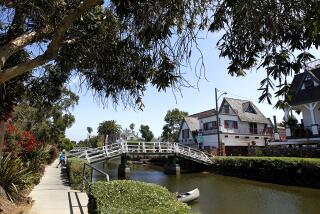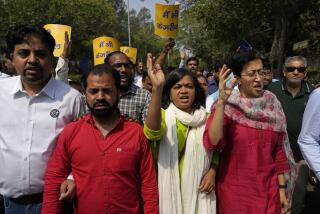Gang rape of photojournalist shocks India; 1 arrested, 4 sought
NEW DELHI -- Police in Mumbai arrested one suspect Friday and launched a search for four more after a brutal rape in India’s financial capital sent shock waves across the country, the latest vicious crime against women that’s battered the nation’s global image and led to deep soul-searching.
In a news conference, Mumbai police chief Satyapal Singh said that at around 6:30 Thursday evening, a photojournalist in her early 20s, accompanied by a male companion, went to photograph an abandoned textile mill for an essay on abandoned buildings in the lifestyle magazine where she interned.
As they approached the site, he said, they were accosted by two men who told them that photography was not allowed on railway property.
Then “the men tied the male friend’s hands with a belt,” Singh said. “Two of the accused repeatedly raped the girl, turn by turn. There were only two men at first, they called one more, and then called two more.” The attackers are believed in their early 20s and living in the area, he said, adding: “It was a very heinous crime.”
The reported details of the attack were similar to a high-profile rape in the capital of New Delhi in December, in which a 23-year old woman was attacked on a moving bus and her male companion assaulted, sparking violent demonstrations, a new law, fast-track courts and more female police officers. The woman died of internal injuries two weeks later in the hospital.
The latest attack was particularly upsetting for Mumbai, India’s most populous city, which has long enjoyed a reputation as a place where women can travel safely, even at midnight. New Delhi, by contrast, has been dubbed “India’s rape capital.”
News of the Mumbai attack triggered protests, an uproar in Parliament -- where opposition lawmakers accused the government of failing to protect women -- and outcry on social media.
“Sad validation of the fact that NO city in India is safe for women,” actress Gul Panag, a former Miss India, said in a Twitter post. “Despicable! We are shamed!” added opposition politician Nirmala Sitharaman in another tweet. “How many more before the criminals are punished? Wake up, India!”
[Updated, 8:20 a.m. PDT, Aug. 23: Junior Home Minister R.P.N. Singh told lawmakers that the government had asked state authorities for a detailed report on the attack, and recommended that the “harshest” punishment be handed down to anyone found guilty in the case, the Associated Press reported.]
The victim, who cannot be named under Indian law, was admitted to Mumbai’s Jaslok Hospital on Thursday night and is in serious but stable condition with internal injuries, the hospital said in a statement.
Several members of the Mumbai press club protested Friday, criticizing authorities for failing to protect women
Mumbai residents expressed shock and shame over Thursday’s attack. “I think the myth about Mumbai being safer, particularly for working women, was shattered last night,” said Shobhaa De, a columnist and Mumbai socialite. “The character of the city has altered. Absolute lawlessness is prevalent across India.”
Despite the passage of tough new laws after the New Delhi attack, including adding the death penalty for certain types of rape, analysts said political will and enforcement remain weak in a nation where a male-dominated culture is deeply rooted.
“Police don’t want to take responsibility,” said Flavia Agnes, a lawyer and campaigner for women’s rights. “This incident will really bring down the image of the city and will further hurt India’s reputation abroad.”
Though cases such as Thursday’s, involving professional or foreign women, get a lot of attention, activists added, attacks on poor, lower-caste and marginalized women too often go unreported in India, in a culture where rape victims are frequently stigmatized and even forced to marry their attackers.
Rahul Bose, a Bollywood actor and social activist, said there are no quick fixes in a society increasingly fractured and alienated. “If we don’t teach our boys when they’re young, it’s not going to make a difference,” he said. “It’s open season on women.”
A travel industry survey in March found that the number of foreign female tourists coming to India during the first three months of 2013 fell by 35% as news of the December rape in New Delhi spread worldwide. De said she’s frequently asked when she travels abroad whether India is indeed the rape center it’s rumored to be.
“It makes you feel so horrible,” she said. “It’s almost a state of emergency for women across India. Unless we make our voices heard, this will only continue.”
ALSO:
Egypt frees Mubarak as crackdown on Islamists continues
British judge allows search of devices seized from journalist’s partner
Bodies exhumed east of Mexico City; could be missing group from bar
Tanvi Sharma in the New Delhi bureau contributed to this report.
More to Read
Start your day right
Sign up for Essential California for news, features and recommendations from the L.A. Times and beyond in your inbox six days a week.
You may occasionally receive promotional content from the Los Angeles Times.






